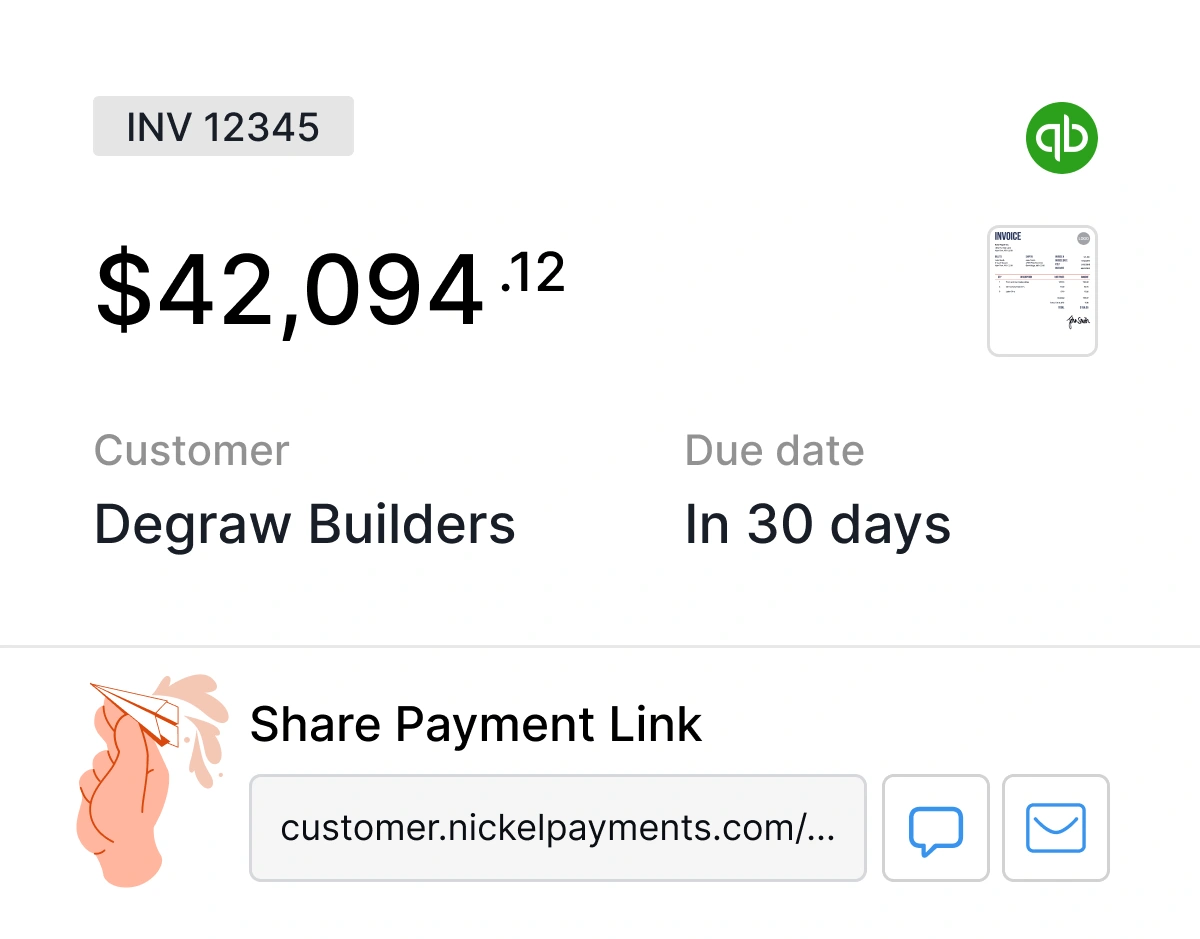The Payment Platform Built for Excavation Contractors
Dig deeper into cash flow solutions with payments that actually work for excavation professionals

Trusted by 10,000+ industrial small businesses














































Why Excavation Contractors Are Switching to Nickel
Unlike traditional payment processors that treat you like a "high-risk" business, Nickel was built specifically for trade professionals who handle large invoice-based transactions. We understand that:
- $85,000 foundation excavation projects are normal business, not suspicious activity
- Seasonal demand surges create payment spikes that banks often flag as unusual
- You need reliable processing during peak construction seasons when cash flow matters most
- Your profitability depends on predictable payment timing, not arbitrary holds from nervous banks
Result: No surprise account holds, no "business verification" delays, no risk department calls when you're trying to get paid.

Why Excavation Contractors Are Switching to Nickel
Unlike traditional payment processors that treat you like a "high-risk" business, Nickel was built specifically for trade professionals who handle large invoice-based transactions. We understand that:
- $85,000 foundation excavation projects are normal business, not suspicious activity
- Seasonal demand surges create payment spikes that banks often flag as unusual
- You need reliable processing during peak construction seasons when cash flow matters most
- Your profitability depends on predictable payment timing, not arbitrary holds from nervous banks
Result: No surprise account holds, no "business verification" delays, no risk department calls when you're trying to get paid.
Before Nickel vs. After Nickel
Multiple systems for invoicing, payments, and bookkeeping
Banks freeze accounts over routine $85,000 site preparation payments
Lose 1-3% on every transaction ($850-2,550 per typical job)
Banks don't understand excavation business patterns
Hours spent matching payments to invoices in QuickBooks
Everything integrated: invoicing, payments, and QuickBooks sync
We understand large and variable transactions are normal for excavation contractors and our support team is highly responsive if you ever run into issues
Keep 100% of what customers pay you
Designed around how your business actually works
Your invoices and payments automatically sync to the right customer, project, and job code, plus seamless AP integration
The Hidden Cash Flow Crisis Crushing Excavation Contractors
The $145.4 billion excavation industry faces unique financial pressures that generic payment processors simply don't understand. With over 236,000 excavation businesses competing for work and clients increasingly demanding flexible payment terms, contractors find themselves caught between rising equipment costs and shrinking margins.
Infrastructure Project Payment Complexity:
Excavation contractors working on infrastructure projects through the Infrastructure Investment and Jobs Act often deal with complex payment structures involving multiple stakeholders. A single road widening project might require coordination between state DOTs, general contractors, environmental consultants, and utility companies. Each layer adds potential delays to your payment timeline, sometimes stretching 30-day terms into 90-day waits.
Equipment and Material Cost Pressure:
Modern excavation requires significant upfront investment in specialized equipment. A new hydraulic excavator costs $300,000-500,000, while a compact track loader runs $75,000-100,000. When you factor in fuel costs that have increased 40% since 2020 and the need to purchase materials before jobs are completed, excavation contractors are essentially financing their own customers for weeks at a time.
Seasonal Cash Flow Volatility:
Unlike indoor trades, excavation work is heavily weather-dependent. Winter freezes can shut down operations for months in northern regions, while spring thaw creates sudden demand surges that traditional banks view with suspicion. This seasonal volatility means excavation contractors often generate 70% of their annual revenue in just 6-7 months, creating cash flow challenges that standard banking relationships weren't designed to handle.
Project Scale Variability:
Excavation projects range from $5,000 residential basement digs to $2 million commercial site preparation jobs. This massive range in transaction sizes confuses traditional payment processors, who may flag large payments as fraudulent or impose holds on legitimate business transactions.

The Hidden Cash Flow Crisis Crushing Excavation Contractors
The $145.4 billion excavation industry faces unique financial pressures that generic payment processors simply don't understand. With over 236,000 excavation businesses competing for work and clients increasingly demanding flexible payment terms, contractors find themselves caught between rising equipment costs and shrinking margins.
Infrastructure Project Payment Complexity:
Excavation contractors working on infrastructure projects through the Infrastructure Investment and Jobs Act often deal with complex payment structures involving multiple stakeholders. A single road widening project might require coordination between state DOTs, general contractors, environmental consultants, and utility companies. Each layer adds potential delays to your payment timeline, sometimes stretching 30-day terms into 90-day waits.
Equipment and Material Cost Pressure:
Modern excavation requires significant upfront investment in specialized equipment. A new hydraulic excavator costs $300,000-500,000, while a compact track loader runs $75,000-100,000. When you factor in fuel costs that have increased 40% since 2020 and the need to purchase materials before jobs are completed, excavation contractors are essentially financing their own customers for weeks at a time.
Seasonal Cash Flow Volatility:
Unlike indoor trades, excavation work is heavily weather-dependent. Winter freezes can shut down operations for months in northern regions, while spring thaw creates sudden demand surges that traditional banks view with suspicion. This seasonal volatility means excavation contractors often generate 70% of their annual revenue in just 6-7 months, creating cash flow challenges that standard banking relationships weren't designed to handle.
Project Scale Variability:
Excavation projects range from $5,000 residential basement digs to $2 million commercial site preparation jobs. This massive range in transaction sizes confuses traditional payment processors, who may flag large payments as fraudulent or impose holds on legitimate business transactions.
Simplified Modern Workflow
Send invoice (or use your existing invoicing)
Customer pays instantly via secure link
Payment auto-syncs to QuickBooks
Money hits your account in 2 business days
Built-in QuickBooks Integration
Your payments automatically sync to the right invoice, customer, and job. No more:


Compare: Nickel vs. Other Payment Platforms
What This Means for Your Excavation Business
Save Money
Zero ACH fees: Save $8,000-15,000 per year on a typical excavation business No hidden costs: No setup fees, monthly fees, or surprise charges Early payment discounts: Pay and get paid faster, capture supplier discounts
Save Time
Automated reconciliation: 3+ hours per week saved on bookkeeping Instant invoicing: Send payment links directly from job sites One system: Stop switching between payment apps, banking apps, and QuickBooks
Reduce Risk
Process large payments worry-free: We understand excavation transactions and provide responsive support when needed Predictable processing: Money hits your account in 2 business days Secure payments: Bank-level security without the bank headaches
Excavation Industry Payment Breakdown
The excavation industry's growth trajectory, driven by massive federal infrastructure investments, creates both opportunities and cash flow challenges that traditional payment systems weren't built to handle.
Market Fragmentation and Payment Complexity:
With over 236,000 excavation businesses operating nationwide, 89% are small operations with fewer than 20 employees. These contractors lack the negotiating power to secure favorable payment terms from banks or processors, often getting stuck with high fees and restrictive policies designed for larger enterprises. When you're moving $50,000-200,000 per month through ACH transfers, even a 1% processing fee can cost $6,000-24,000 annually.
Infrastructure Funding Payment Delays:
The Infrastructure Investment and Jobs Act has allocated billions for excavation-heavy projects, but government payment cycles are notoriously slow. Federal construction projects typically involve 60-90 day payment terms, with additional delays for approval processes. According to the Department of Transportation, only 35.3% of announced grants have been allocated as of early 2025, creating uncertainty in project timelines and cash flow planning.
Equipment Financing Challenges:
Modern excavation requires specialized, expensive equipment that depreciates quickly. A standard excavator fleet for a mid-size contractor represents $1-3 million in equipment value. Traditional financing often doesn't account for the seasonal nature of excavation work or the feast-or-famine cash flow patterns common in the industry, making it difficult to secure equipment loans that align with actual revenue cycles.
Regional Concentration Risk:
Excavation work clusters around growing metro areas and infrastructure projects. States like Florida (with rapid urban expansion), Texas (energy sector growth), and the Southeast (hurricane recovery work) create regional concentration where weather events or economic shifts can impact thousands of contractors simultaneously. This geographic concentration amplifies seasonal cash flow challenges that traditional banking relationships struggle to accommodate.

Excavation Industry Payment Breakdown
The excavation industry's growth trajectory, driven by massive federal infrastructure investments, creates both opportunities and cash flow challenges that traditional payment systems weren't built to handle.
Market Fragmentation and Payment Complexity:
With over 236,000 excavation businesses operating nationwide, 89% are small operations with fewer than 20 employees. These contractors lack the negotiating power to secure favorable payment terms from banks or processors, often getting stuck with high fees and restrictive policies designed for larger enterprises. When you're moving $50,000-200,000 per month through ACH transfers, even a 1% processing fee can cost $6,000-24,000 annually.
Infrastructure Funding Payment Delays:
The Infrastructure Investment and Jobs Act has allocated billions for excavation-heavy projects, but government payment cycles are notoriously slow. Federal construction projects typically involve 60-90 day payment terms, with additional delays for approval processes. According to the Department of Transportation, only 35.3% of announced grants have been allocated as of early 2025, creating uncertainty in project timelines and cash flow planning.
Equipment Financing Challenges:
Modern excavation requires specialized, expensive equipment that depreciates quickly. A standard excavator fleet for a mid-size contractor represents $1-3 million in equipment value. Traditional financing often doesn't account for the seasonal nature of excavation work or the feast-or-famine cash flow patterns common in the industry, making it difficult to secure equipment loans that align with actual revenue cycles.
Regional Concentration Risk:
Excavation work clusters around growing metro areas and infrastructure projects. States like Florida (with rapid urban expansion), Texas (energy sector growth), and the Southeast (hurricane recovery work) create regional concentration where weather events or economic shifts can impact thousands of contractors simultaneously. This geographic concentration amplifies seasonal cash flow challenges that traditional banking relationships struggle to accommodate.
Ranked #1 Easiest to Use Payment Solution by G2
See why Nickel outranks every major competitor, including Forwardly, Melio, and Square
Get Started in Minutes
No contracts. No setup fees. No risk.
Sign Up (2 minutes)
Connect QuickBooks (1 click)
Start Getting Paid (immediately)

Ready to Fix Your Payment Problems?
Stop losing money to fees and time to complicated workflows. Join thousands of contractors who've already made the switch.








